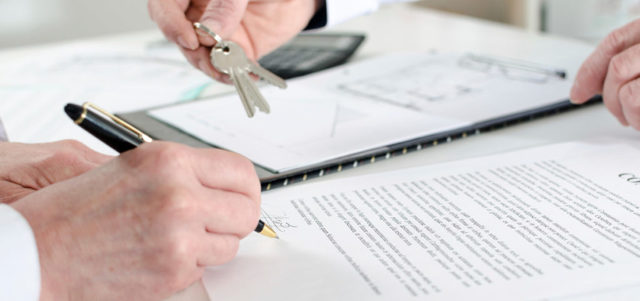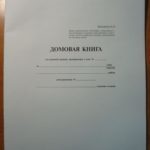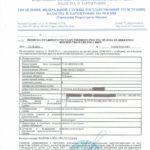The acquisition of housing is not only a joy in human life, especially if it is the first purchase, but also a serious and responsible undertaking.
Most citizens usually use legal offices in sales processes, but it is possible to buy an apartment on their own.
It is necessary not only to know all the subtleties and legal aspects of the process to be undertaken, but also to understand the difficulties that may arise in making the purchase.

Legislative basis and substance of the transaction
Buying an apartment is a process in which a buyer, on the basis of legal documents and for a certain amount of money, takes possession of the dwelling.
The documents provided by the seller for the sale of the apartment and required for its registration are regulated in FL 122 "On State Registration of Real Property Rights" of 21 July 1997.
A common person does not often have to buy or sell property, so often when the need arises, legitimate questions arise: "How is the purchase going? What documents should the seller of an apartment provide to the buyer?" The answers will follow.
Permanent real estate transactions are the main activity of specialized real estate agencies and notaries.
It is these organizations that are often approached by citizens who wish to buy housing.
In the case where a person has chosen to arrange the dwelling on his/her own, he/she must have a clear idea of the documents that the seller of the dwelling must hand over to the buyer.
Purchaser ' s documents
In order for the transaction to be successful, it is important to comply with all the requirements and standards in the issuance of documents. What documents must the seller of an apartment give to the buyer? Where can real estate be registered? What is required of the future owner? These and many other questions arise for people who want to have their own metres.
Before going to negotiate, it is necessary to find out what documents the seller needs to sell the apartment from the buyer. Acquisition of housing is a two-way process, so the buyer as a bidder also needs to prepare.
A person interested in acquiring real estate will need the following documents:
- a passport (for those in urgent service, it is possible to obtain the necessary documentation on the basis of a military ticket, for minors, birth certificates);
- If the buyer is married, a marriage registration certificate is required, as well as the notarized consent of the second half to the purchase (as long as the couple lives in peace and harmony, this measure may seem unnecessary, but it will be very appropriate for divorce);
- In the case of a trusteeship transaction (with the duration of the transaction) the passport of the trustee is granted.
In addition, when an apartment is purchased in a mortgage, a list of documents approved by the bank is required; the financial organization claims not only the identity of the borrower but also his or her capacity to pay; therefore, the package will be larger than when buying a dwelling for the buyer ' s own money.

Procedure for processing the transaction
The real estate market is a reasonably profitable niche in which fraud is a common phenomenon. In order not to end up without money or housing, it is important to approach the issue of the choice of intermediaries and trading partners with knowledge.
In performing a transaction, it is mandatory to comply with all the following stages:
- Introduction to the seller ' s documentation: Once the property has been pre-screened, the financial issues regarding the cost of the dwelling have been resolved, it is necessary to carry out a thorough examination of the legal and other documents required for the transaction. If the future owner of the real estate is legally attached, the study can be carried out on his own, but not everyone knows what documents the seller of the dwelling should provide to the buyer; therefore, at this stage, the assistance of a literate person will not be unnecessary.
- Registration of the transaction: At this stage, it will be necessary to draw up a document confirming the bilateral agreement, which must be in triplicate (seller, buyer, registration authorities).
- Making an application to Rosreister.
- Payment of the public service (the obligation is imposed on the buyer) The registration office is required to produce the original payment document (which may consist of a cheque or receipt).
Basic list of documents required from the seller
The main issue that concerns future owners of real estate is: What documents are required to provide the seller of an apartment to the buyer?
The buyer, in the case of a property that is not a new structure, must understand that any dwelling has its own history: this implies that all transactions in real estate cannot be brought under a single template.
Each purchase is processed in its own way. Based on the individual characteristics of the dwelling, it can be concluded which documents the seller of the dwelling must hand over to the buyer.
- Passport;
- Housing rights;
- Legal act on the basis of all owners;
- Technical passport, identification of the cadastral number.
In the absence of any of the above-mentioned papers, the transaction cannot be made; only after everything is ready may there be further discussion of the sale; and what documents the buyer needs from the seller of the apartment have been described above.

Law-making papers
A factor confirming that a person is the owner of the property being sold is a certificate of State registration of the right. What documents does the seller of the flat give to the buyer? Their type is due to the circumstances of the current owner ' s acquisition of the dwelling and can be presented in the form of:
- A contract for the purchase of real property (provided that the occupied dwelling was purchased for cash);
- Free gift transaction, inheritance of immovable property;
- Life-long service contracts;
- The housing and building company ' s certificates confirming payment of the full price of the drink.
It should be borne in mind that the old models of title documents differ to a certain extent in appearance from modern ones, but both (provided that the document is prepared in accordance with the rules and requirements of the law) have legal effect. The seller ' s documents on the sale of the dwelling must be genuine and paper-based.
Property rights must be registered in Rosreestre; the document issued must contain information on the owner of the dwelling, describe the real estate and include information on the encumbrances.

Key points in the verification of real estate prior to purchase
In order to provide a correct picture of the documents that the seller of the dwelling must provide to the buyer, it is necessary to study the history of the dwelling sold in more detail. Some nuances should not be overlooked for the safety and legitimacy of the transaction:
- Whether there are persons who are not listed but who have the right to reside in the territory to be removed (juveniles; pensioners who are at the time of sale in old age homes; persons who are being treated or imprisoned; military personnel);
- Whether other citizens have rights to the property to be purchased (rent, bail, under arrest);
- If there is a remodelling in the apartment, the owners must have authorization documents to carry out such changes.
In order to avoid further problems with tenants, other owners or authorities, the buyer is also required to bear in mind the documents provided by the seller of the dwelling to the buyer, in addition or on demand: statements confirming that there is no debt for the LKR, the paper from the ERRC (containing information on the area of the dwelling, the owner and the prescribed persons), as well as a certificate from the psychoneurological clinic (if there is a driver ' s licence, it is not requested).
The documents provided by the seller of the flat to the buyer also require the consent of the second spouse to the transaction.

Agreement of exclusion or acceptance-transfer
However, it is important to remember that the purchase of real property should not be limited to a contract alone.
In addition to this, an act of reception or transfer or a contract for the removal of real property is required.
The document shall be in writing and shall contain the following particulars:
- The details of the contract;
- Personal details of the parties to the transaction;
- The time and place of the transaction;
- The parameters and technical characteristics of the property to be disposed of according to the record in the State Real Estate Registry.
All the information listed: the area of the dwelling, the appearance, whether there are repairs, facilities, and so forth — is described in some detail.
After describing all the parameters, the parties summarize the act with some wording indicating that one party (seller) transfers the object, the other party (buyer) accepts it.
In addition, participants confirm that there are no claims for expropriated property and that, as a result, the paper is certified by bilateral signatures.
Registration in Rostreister
At the end of the transaction, immovable property must be registered with the State Registration Office (Rostreestre) located in the region where the dwelling is located; this procedure must be carried out within the days following the official transaction if the registration of the acquired property is to take place without delay.
The registration procedure is as follows:
- The first place to start is by writing a statement. This paper is modelled on the passport data of the buyer and seller and reflects the legal basis for registration. In addition, the exact address of the registered property, the area, the number of rooms are included. The date is indicated. The document is certified by the applicant ' s personal signature.
- A contract of sale is attached to the application.
- Payment of State duty (to be agreed between the parties on its own).
- A receipt of acceptance of the application and the attached documents shall be given to the buyer.
Under the law, a certificate of ownership is issued within a month (maximum period of time), once the document has been received, the holder may fully and legally use and dispose of the acquired dwelling.

Letters: the concept and role of the transaction
Any buyer is also required to know which documents the seller of the dwelling gives to the buyer other than the above.
The registration process does not, from a legal point of view, imply payment and the seller is therefore entitled to avoid the contract.
It must be understood that, even with full confidence among the parties to the transaction, there is some possibility to secure the transfer of funds and to provide proof of that fact; there is a receipt for this purpose.
A document that is the guarantor of the transaction is subject to certain requirements:
- is written (preferably in hand-written form);
- The certification of the document is notarized (not necessarily but desirable);
- The existence of third parties in the preparation of papers, a signed witness certificate.
The receipt is an important act enabling the buyer to confirm the validity of the transfer to the property of the property to be disposed of, and may be made available in court or from a notary in the event of a dispute.
Self-writing of the transaction: pros and cons
Of course, it is possible to buy an apartment without the involvement of a variety of professionals, and there are advantages in this.
- To pay for the expensive services of lawyers;
- Issue documents notarized (only when necessary);
- Overpaid for real estate services.
These conditions are more appropriate for people with certain legal knowledge or professionals whose professional activities are related to legal issues.
Often, a stand-alone approach requires much more time, in-depth knowledge of legal relations or a real-estate firm of its own, and the buyer will not only incur costs, but will also receive a degree of sponsorship in the course of the transaction.
The specialists work directly with both parties to the process, explaining what is required of the customer, which documents the seller of the apartment must hand over to the buyer.
Members of a legal organization are fully engaged in the preparation, processing of a contract, accompanying the sale and registration, and it should be borne in mind that, even with full legal support for the purchase, no one can provide a full guarantee.
However, if a highly skilled person is employed, all possible risks are minimized.
In any case, it is important that the documents that the seller of the dwelling must provide to the buyer should always be monitored on its own, so that the risk of being deceived is reduced.
Source
Documents that remain with the buyer after the sale of the apartment
Once a dwelling has been purchased and documents have been processed, it is worth considering what documents the buyer has left after the purchase of the new apartment, which will require several more stages of the sale of real estate.

Documents to be held by the buyer
 Such transactions are most likely to take place in several stages:
Such transactions are most likely to take place in several stages:
- Signature of an agreement for the acquisition and sale of an immovable object.
- Signature in the Act of Reception and Transfer of Tenure.
- Application for registration of ownership of an apartment in Rosreister and subsequent fixation of the transfer and registration of the right to the buyer.
- The agreement on the sale of property is a document of the right of ownership of the dwelling, and the buyer obtains the owner ' s rights on the basis of that paper, and it must therefore be in his hands.
- The acceptance certificate shall constitute the transfer of the dwelling from the seller to the buyer, after which the latter shall be responsible for the preservation of the facility.
- The registration of the owner ' s right under the sales agreement is recorded in a certificate from the EGRN, which remains with the person who bought the apartment.
In order to register the right of ownership of the dwelling, the relevant contract and the acceptance act are transferred to Rosreister in at least two copies (in accordance with the law); in fact, the number of agreements and acts corresponds to the number of parties involved in the transaction.
Other documents to be retained by the buyer:
- The cadastral passport;
- Technical passport;
- A paper from the tax office confirming that there is no debt;
- Certificate of non-debt for services provided by public utilities;
- A document confirming the non-payment of contributions by a member of the TCA;
- It's a home book.
Issuance of additional documents
 The housing transaction that has taken place is not the end of the entire process.
The housing transaction that has taken place is not the end of the entire process.
Depending on the housing purchased, the buyer needs to do a number of other things, and then some paper remains with him.
Proprietary
If a dwelling has been purchased to reside in it rather than to be used as a business site, it must be registered for a week ' s duration.
The application is submitted to the FMC or the IFC, but it can also be done online through the public service site.
In addition to the application for a propiska, the holder ' s passport and the home book must be in hand.
Utilities charges
The matter must be resolved quickly, and all the agreements are rewritten in the name of the new owner, which means that the payer in the face accounts is also being changed.
The following steps should be taken:
- To apply to the RCC for a new name for all accounts;
- To enter into a housing service agreement with the TCW;
- To apply to the energy firm and to the hump;
- The water meters are also changed to a new name;
- If the Internet and telephone have already been installed in the accommodation area, the contracts with operators are also being rewritten.
If there is a TCA in the house, it is necessary to apply for participation.
Tax
There are two actions that need to be taken:
- Place housing on a tax register: Russian citizens are required by law to declare their real property; in the event that the tax is not paid, the debtor will have to pay a fine of 20 per cent of the debt.
- Income tax deduction: The tax payer returns 13% with the highest amount of 2 million roubles, i.e. a deduction of 260,000 rubles; the restrictions do not apply to the amount for the purchase of a mortgage.
If the tax restructuring has already taken place, there is no tax deduction against the interest paid because in this situation the purpose of the loan is to pay interest on the previous loan.
In order to receive a deduction, you must have:
- The documents confirming this right, i.e. certificate 3-NDFL;
- Passport;
- IDN;
- Sales agreement;
- The act of admission and transfer;
- A residence certificate;
- a receipt left by the seller receiving payment for the immovable object;
- Credit agreement (if the apartment was purchased on credit);
- Bank certificate of interest paid under the contract.
A citizen who has an official job is entitled to a deduction and the amount paid by the employer during the year shall be returned; if it does not exceed the amount of the return prescribed in the documents, the application shall be renewed for payment in the following years.
Deductions are also granted as an exemption from tax on income within a specified period of time; in order to obtain it in this way, it is necessary to provide the necessary tax paper to the company ' s accounting; a 3-NDFL certificate is not required in such a case.
No deduction shall be made if the apartment was purchased from close relatives or guardians and if it was paid for by money from the parent capital, the employer ' s finances or State benefits.
In order to obtain a deduction, the following documents are required:
- Passport;
- Certificate of the owner of the premises;
- Sales agreement;
- An extract from the home book;
- a passport with the data from the cadastre.
Mortgages and documents
 The purchase of a mortgage is different from the standard transaction, which is that a security mark is entered into the registry for the mortgage in favour of the mortgage, the mortgage itself being registered under the mortgage, credit agreement and the sales contract in which the item is mentioned.
The purchase of a mortgage is different from the standard transaction, which is that a security mark is entered into the registry for the mortgage in favour of the mortgage, the mortgage itself being registered under the mortgage, credit agreement and the sales contract in which the item is mentioned.
- Once the registration process has been completed, the creditor receives the mortgage, which means that the buyer will not be able to take it from Rostreestra.
- Since the buyer submitted the original loan agreement together with its copy, certified by the desk officer receiving the documents, the registrar will reconcile the information contained in the document, then leave the copy in the archives and return the original to the buyer.
- As a result, the buyer receives the following documents:
- A sales agreement signed after registration;
- The acceptance certificate (if available at the time of registration);
- An extract from the Register of Tenure.
Documents for the seller
 The seller must also take the documentation from the register and keep it; for this to happen, he must have a passport and a receipt of the documents, either to the IFC or to the office of Rosreestre, which is responsible for issuing the papers.
The seller must also take the documentation from the register and keep it; for this to happen, he must have a passport and a receipt of the documents, either to the IFC or to the office of Rosreestre, which is responsible for issuing the papers.
If the documentation is not received on time, it can be taken directly from the Rosreestra archive later, and post-sale papers will necessarily be required by the seller to apply to the tax service.
The purchase and sale of housing is a complex and time-consuming process, and it is the commitment of the actions that depends on the continued calm and well-being of both the buyer and the seller.
What documents remain in hand after the purchase of the apartment
- What documents remain in hand after the purchase of the apartment
- Protection of seller ' s and buyer ' s rights in the transfer of ownership
- List of documents for the sale of an apartment and other useful information on the subject
- Free legal advice on real estate — contracts, transactions, eviction/housing
- Procedure for the registration of contracts for the sale of real property
- Who registers ownership of real estate
- List of documents for application and registration of rights
- Documents provided in Rosreister for the purchase of a dwelling in a new building
- Time limit for issuing a certificate of registration of a contract for the sale of real property in Rosreestre
- What if the seller has lost the registration certificate
- Consent of the spouse to a real estate transaction
- There's a minor in the apartment.
- Can the seller refuse to file with Rosreister
- Suspension of registration of the contract for the sale of the apartment by Rosreestrom
- Refusal to register property ownership
- What should be done after buying the apartment?
- What actions should be taken after the purchase of the apartment this year?
- What issues the owner of the new real estate needs to resolve this year?
- What documents need to be processed after the purchase of the dwelling
- What contracts need to be processed and rewritten upon purchase of the dwelling
- Actions after buying an apartment at the secondary market, at the developer's, mortgage
- What documents remain in hand after the purchase of the apartment
- Necessary documents for the purchase of a second-hand apartment
- Formation and registration of a contract for the sale of an apartment
- What documents should be asked from the seller and what mistakes are most commonly made by buyers of a foreign dwelling?
- Actions after buying an apartment at the secondary market, at the developer's, mortgage
- Actions to be undertaken after registration in Rosreister
- 8 reasons for stopping registration of real property rights
- What documents are needed to buy an apartment in 2018?
So, there's a contract for the sale of an apartment, and the parties are willing to turn it over for registration and calculation, and consider ways to protect the rights of the seller and the buyer in the transition of ownership from one to the other.
The real estate authority can be trusted to file the registration documents by issuing a notarized power of attorney, but it is better to go through the entire registration process on its own; the parties meet at the registry office on a scheduled date and each party to the transaction must have certain documents in their hands.
- Salesman..........................................................................
- Passport (passport, copy left)
- Certificate of ownership
- The documents on the basis of the certificate
- Property valuation certificate
- Archival certificate on Form 9 or an extract from a home book
- Application for registration of the transfer of ownership to the buyer
- A copy of the marriage certificate
- Notarized consent of the seller ' s spouse or a statement from the notary that the seller was not married at the time of the transaction
- Certificates from the psychoneurological and drug treatment clinic (at the buyer ' s request)
- Authorization of guardianship and guardianship authorities (if juvenile owners are present)
- Certificate of non-payment of utility charges
- Certificate of non-debt in real estate tax
- Transfer certificate (after full payment)
- Buyer.................................................................
- Passport (passport, copy left)
- Sales contract, plus copy for registration service
- A copy of the marriage certificate
- Notarized consent of the buyer ' s spouse, or a statement from the notary that the buyer is not married at the time of the transaction, or a copy of the marriage contract if concluded
- A bill of payment of the State for registration of the contract of sale
- Credit for the payment of the Minister of State for the transfer of ownership
- Credit contract and mortgage (if any)
- Transfer certificate (after full payment)
- Salesman..........................................................................
- Half of the government is for registration of the sales contract
- Buyer.................................................................
- Certificates received by the seller at the Psychoneurology and Drug Clinic
- Half of the government is for registration of the sales contract
- I'm gonna go for the transfer of ownership.
After the parties have filed the registration documents, the representative of the registration office gives the buyer a receipt on the receipt of the documents, the receipt indicates the date of receipt of the documents in the name of the buyer, usually 14 days, and the date of purchase of the mortgage is shorter than 7 days.
Before paying again, a few days before the transaction, the buyer must obtain a fresh discharge from the EGRP to the apartment and make sure that the seller still owns it.
The buyer becomes the owner not from the time the contract is signed but from the time of the registration of the ownership right, so it is absolutely impossible to transfer the money for the dwelling to the seller until the registration of the ownership right.
The seller, on the other hand, must make sure, before the registration documents are delivered, that the buyer has the money; each party must be sure that, at the end of the transaction, the seller will receive the money and the buyer of the apartment.
Therefore, all calculations are carried out in two ways:
Precalculation before registration (to deposit money in a cell or to deposit it in an account),
Final settlement after registration (take of money from the cell, withdrawal of money from the account).
There may be a third payment, e.g. after the seller leaves the apartment, in which case the payment schedule and the discharge date should be reflected in the contract.
Prepayment, if any, shall normally be returned in full to the buyer and the parties shall conclude a contract of sale without specifying any prepayment clauses and set-off.
Sometimes, more often in contracts with legal persons, the existence of a preliminary contract and its advance payment are specified in the contract of sale, in which case the parties must sign an additional agreement to the contract of sale to set-off payment under the pre-contract against payment under the main contract.
In this case, the seller has not yet received the money for the apartment, but has already signed a contract that he sells the apartment without encumbrance until the final settlement, and he has signed that in the event that he does not receive the money from the bank cell, the apartment will still be owned by the buyer.
When cash is received, the parties shall indicate a fraudulent amount in the contract, and the seller shall issue a receipt to the buyer in order to obtain money from the buyer for a real amount.
As a result, the buyer has no money (already) nor an apartment (already), but there is a low-value contract and often no valid receipt, and the seller has both the money and the property and the low-value contract.
The contract states that the settlement between the parties is complete, but the amount in the contract is different; this payment scheme is the most dangerous of all possible.
When paying through a bank cell, the parties reserve the box in advance at a certain bank and come to a meeting on a designated day.
The contract is made for all parties to the transaction, i.e. the parties to the contract are the seller, the buyer and the bank; the contract specifies the terms of the lease and the conditions for the recovery of the money.
The duration of the lease, the time when the seller received the money, the conditions for the seller ' s receipt of the money, the list of documents that the seller was required to produce upon receipt of the money, the possibility of the buyer receiving the money if the transaction did not take place.
The parties settle in the bank and together put the money in the box. Everyone must personally make sure that the key is locked in the box to prevent any fraud, including the exchange of money. One key stays in the bank, the other key is taken by the buyer.
But he cannot come and collect his money tomorrow, because it is prescribed under the conditions of access that a buyer may collect his money only if the seller does not come after the said time limit, and the seller can only come for it if he brings a registered contract between him and the buyer.
The person who keeps the key gives the other person a receipt that the key has been taken and that he undertakes to give it to the other party in fulfilling his obligations.
Once the contract is registered and the right of ownership is transferred to the buyer, he gives the key to the seller. Sometimes the key is given to the seller in the first place. The seller with the key and the registered contract receives the money from the bank.
It's impossible to tell which key-storage scheme is better, because both sides of the deal are dependent on each other, which allows for situations where someone's running after someone and someone's blackmailing someone.
- The following schemes of deception are possible here.
- Robbery on the way to a bank or a bank.
- The theft and substitution of keys, the production of duplicate keys by the buyer, followed by the withdrawal of money from the cell.
- Postponement of the transaction until the buyer can return to the bank and recover his money from the allegedly failed transaction, even if the documents have been filed for registration.
- A change of money between checking the bills and counting them and closing the money in the box.
Falsified registered contract for money-laundering (in theory), for insurance against such a situation, it should be stipulated in the contract with the bank that the seller, together with the contract, must present an extract from the EGRP.
The robbing of the cell during the storage period (such cases are known); the bank is not responsible for the items that are stored in the cell; it is responsible for the preservation of the cell itself.
Paying in cash is safer, and therefore preferable.
Payments between seller and buyer shall be made by means of a bank letter of credit.
The buyer deposits the money in the bank and transfers it to the seller ' s account, but on condition that the seller can withdraw it only if it proves that ownership of the apartment has been transferred to the buyer.
This evidence can be found in the registered sales contract, the old certificates marked "recovered", the extract from the EGRP. The money is sent to the seller ' s account, but in fact it never comes into his account, as if the bank were freezing them before the documents were presented.
If the change of ownership does not occur, the money will return to the buyer within a certain period of time, with a deadline of up to three months, more than one month.
The buyer transfers the full amount to the seller ' s account from its account, and the proof of payment is the payment order received from its bank; a portion of the amount may also be paid in accordance with the payment schedule specified in the sales contract.
If payment is made in full, the parties shall state in the contract that payment is made in full, in which case the dwelling may already be handed over to the buyer by means of the transfer document, and the parties shall therefore sign the transfer certificate and file it for registration.
In the event of partial payment, the buyer continues to pay according to the payment schedule after the owner has become the owner; in the absence of payment, the seller may apply to the court and request termination of the contract because the buyer does not pay.
The buyer ' s certificate of ownership indicates the encumbrance of the right, as the buyer has not yet fully paid the rent; the encumbrance will be lifted only after the full price of the apartment has been paid.
It is essential for the buyer to keep all payments so that each payment can be proved.
The realtor's role in the filing phase and in the calculation is minimal, especially if the transaction is direct. If the transaction is an alternative, the realtor is necessary, and he acts as the coordinator of the actions of all the participants. In any transaction, the real estate agent can file documents for you with the registration office on a notarized power of attorney.
Collection of documents after registration
The deadline for the termination of the registration is indicated in the receipt that was issued at the time the documents were delivered.
The seller receives its documents – one copy of the sales contract and an old certificate marked "reposed" (sometimes the mark is forgotten), while the buyer receives its documents – a certificate of transfer of ownership, a registered contract and other documents establishing it. The documents can be obtained by trust, the power of attorney must be notarized.
All documents must be kept, in the event of future litigation, all of them will be useful. Payments, transfer documents, copies of the spouses' agreement to the deal, a copy of the passport of the second party to the transaction – each of these documents may be useful in the future.
The transfer certificate shall be signed after the parties have made the calculations.
In theory, when calculating through a bank cell, the parties shall state in the contract that all calculations have been made in full and shall sign the transfer certificate before registration, although, in fact, the calculations have not yet been completed.
This is to the extent that the transfer of ownership did not include an encumbrance due to incomplete payment, which would then have to be withdrawn.
The fact that the transfer document had been signed confirmed that the parties had fulfilled all their obligations: that the buyer had received the apartment and that the seller had received its money; in fact, no one had yet received anything, so it was not necessary to sign the transfer document until the final settlement.
If, after signing the transfer certificate while the documents are in the registry, something happens to the apartment, such as a fire or a flood, the buyer will be held fully responsible for what happened, even if the seller still lives in the apartment in fact.
What recommendations can end this article?
- At the end of the transaction, try to follow the following rules:
- Surrender the registration documents and obtain them from the registration themselves;
- Pay or accept the payment in cash;
- minimize the turnover of cash (risk may arise not only from the seller or buyer, but also from witnesses to the transaction - agency, bank, security personnel);
- Enter the full amount in the contract;
- In the sales contract, do not write that the calculations are complete if they have not yet been completed (even if the money is in the box);
- Do not sign the transmission document before the calculation is completed.
- Legislation
- Article 171. Inviolability of a transaction made by a national deemed to be incompetent
- Article 176: Inviolability of a transaction made by a citizen limited by the court in its capacity
- Article 177. Inviolability of a transaction made by a national unable to understand or direct the meaning of his or her actions
- Article 178. Inviolability of a transaction made under the influence of error
- Chapter 23: Enforcement of obligations
- Chapter 27. Concept and terms of the treaty
- Article 429: Preliminary contract
- Chapter 30: Sales
- Article 550: Form of contract for the sale of real property
- Article 551. State registration of the transfer of ownership of real property
- Article 556. Transfer of real property
- Article 922 of the Russian Civil Code: Storage of valuables in an individual bank safe
What documents the buyer receives when buying an apartment
Buying and selling any real estate is a complex process that involves collecting papers, repeatedly agreeing on the terms of the transaction, taking into account risks and guarantees.
The seller's actions in concluding a contract are usually considered, but what do the buyer do? What documents does he receive when buying an apartment? Where to go with them? The buyer's correct actions to make the transaction work? In this article.
What should be done after the conclusion of the contract for the sale of the apartment?
As a general rule, a sales transaction ends with the issuance of an act of acceptance, payment of the contract amount — a letter of credit account can be used for the purchase of an apartment or a cell, and thus the conditions for the transfer of ownership to the buyer are in place.
What do we do next?
What documents should be processed?
In the contract of sale, the parties usually prescribe when the buyer becomes the owner and when the seller gives him the keys to the dwelling.
Since the receipt of the property — the relocation to it and the payment of various payments for it — of communal, housing, tax and other assets, the person has proof of ownership.
If, for example, it has to be confirmed that he is the true owner, who will show receipts of the LAC payments and the property tax.
In addition, the work carried out at the expense of the repairs, the construction of the house, and the transfer of its property to it are proof of its rights.
- However, all these grounds are secondary.
- Russian legislation provides for a method whereby a person is officially recognized as the owner of property at the federal level, i.e. the State registration of property rights in Rosreestre.
- Incontrovertible proof of the transfer of ownership of real property is:
- The registration of property rights in the REM register;
- Issuance of an extract from the register in which the buyer is identified as the owner.
Of course, if the seller has concealed from the buyer certain facts that prevented the disposition of real property, the contract of sale may be declared null and void by the courts and the State registration may also be cancelled, but in a normal transaction, it is this certificate that must be obtained by the buyer immediately after the taking of the property, a statement of the registration of the right of ownership.
If the dwelling purchased is not on the cadastre account, the buyer, by submitting the papers for registration of rights, shall at the same time initiate the cadastre account: both rights and cadastral data are entered in Rosreister.
Until 2015, the result of the GTC records was a cadastral passport, and now it's a statement of the main characteristics of the site.
In order to put real property on cadastral records, it is necessary to have a technical plan that corresponds to the real condition of the dwelling.
For example, if a site has been remodeled (or remodeled) without a permit, a new technical plan will have to be ordered to reflect the changes made or to return the dwelling to the type shown in the plan if there is a violation of the requirements for the remodelling of the dwelling.
Data on the LKH are also being re-formed, but it is not necessary for the tax authorities to obtain this information through an inter-agency exchange if they wish to submit a tax copy of the documents showing the purchase of housing and the change of registration.
If the registration of ownership is delayed, all taxes will be levied on the former owner, and the matter should be resolved as soon as possible.
As a result, the buyer needs to process the following documents::
- On registration of ownership;
- on cadastral accounting;
- A technical plan — if it did not exist or if it is outdated;
- Utilities;
- Tax data.
Perhaps some less important forms will have to be processed with their own data.
What documents should be in the buyer's hands?
In order to register ownership and change the rest of the paper, the buyer must hold the following documents::
- Application for registrationThe form of the document can be found on Rosreestro's official website, Rosreestr.ru.
- Buyer ' s passportand if the representative submits an application in his place, copies of the applicant's and representative's passports.
- Reliance on registration of ownership of a dwellingIf the package is provided by a representative, it can be accepted irrevocably or may be returned with the result of the service. Parents may apply for children under 14 years of age, and a power of attorney is not necessary, it is sufficient to bring copies of the child's certificate and the parent's passport.
- Compensation of payments to the Ministry of Foreign Affairs- granted at the request of the applicant, a staff member of Rosreestra or IFC may not refuse to register the application due to the absence of a cheque, but it is important to know that if a fee paid by the applicant is not found in a single information system for public and municipal payments, the application with all the documentation will be returned to the applicant in 10 working days, either in person or by mail. In the case of an electronic application, an electronic notice of refusal will be sent, so it is better to provide the receipt.
- Legal basis documents for registration of ownershipThe important thing is that if the apartment was owned prior to the purchase or the owners were minors, persons of limited capacity, persons of limited capacity, persons of total incapacity, and if the payee is burdened with life-long maintenance, in all these cases the contract of sale must be certified by the notary, otherwise Rosreestrester will not accept the documentation package for the registration of ownership. One copy will remain in the Rosreestra archive, the other will be returned to the submitting person.
Registration in Rosreestre finally confirms the transfer of ownership.
- Transmittance Actor another agreement the conclusion of which is required by the contract of sale.
- Consent from State guardianship authoritiesTo dispose of property belonging to children under 14 years of age or disabled citizens, how to sell a privatized apartment with minor children, read here.
- Marriage contract or court decision on the division of property of spousesor other documents proving that the dwelling did not exist or did not enter the joint property of the spouses (former owners).
- The consent of the second spouse to the disposal of the jointly owned apartment, certified by the notary, is in common marital property, and the documents for the approval of the sale of the apartment are here.
- On sale of shares in the apartment- The documents confirming that at the time of its sale the seller had notified the other owners and had not violated their right to the highest ransom were awaiting an answer for 30 days and only then sold his part to the current owner.
- Consent of parents, guardians or guardiansif the child owner, aged between 14 and 18, has sold the property he owns.
- Bail holder ' s consentIf a mortgage is sold, the mortgage can be sold and the other can be read in this article.
- An extract from the home bookprovided by the migration authority (passport table) can be obtained from the IFC, 5 working days can be received and 1 month is valid.
- Technical plan- if there was no cadastral record.
Other documents may be needed depending on the nature of the transaction; for example, when using external funds (pots or housing subsidy, maternal capital), the buyer must provide a loan/mortgage contract, a certificate of maternal capital or housing subsidy to Rosreister, etc.
To provide for everything, you have to:
- or request all papers from the seller in advance, still at the stage of negotiation,
- Or agree that if necessary, he will provide the necessary papers after the deal.
An agreement can be made through a notary or legal support for the purchase of an apartment. A good specialist will ensure that the buyer has all the necessary forms and forms on his hands. The price of a contract for the sale of an apartment from a notary right here.
In accordance with article 333.14 of the Russian Tax Code, the amount of the State budget for the registration of a dwelling is 2,000 roubles, which can be paid in any bank, ATM, terminal, Internet-banking or electronic wallet.
What documents do the seller keep?
As a result of the transaction, the buyer receives:
- Sales contract registered in Rosreestre: If the buyer has delayed the registration, a simple sales contract (or a certified contract in the case of a notary transaction).
- It's an act of reception, if it ever happened.
- It's a contract receipt.
If the seller so wishes, the seller may keep any data on the apartment, making copies of them before the change of rights.
Video of the list of documents that the buyer will receive upon purchase of the studio apartment:
Conclusion
The documents that remain with the parties after the sale of the apartment are very important; they guarantee mutual rights and obligations, as well as the validity of the agreements concluded.
In the event of claims by outsiders or public authorities, the seller and the buyer will always be able to demonstrate the legal purity of the transaction and to rid each other of civil and judicial proceedings.
It is important to make a good deal and a list of the papers that each party will receive.
This requires either careful examination of legislation and practice on the issue, consideration of options for the conduct of the procedure, visits to the IFC and consultations with the operator in the "Consultation on the Registration of Ownership" mode, or a transaction with a qualified professional.
For further information on this subject, please refer to the purchase section by reference.







